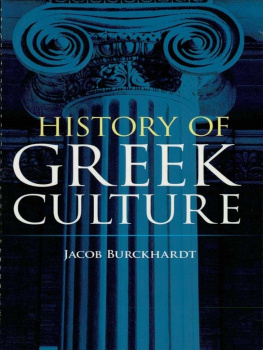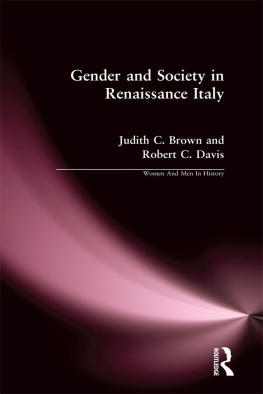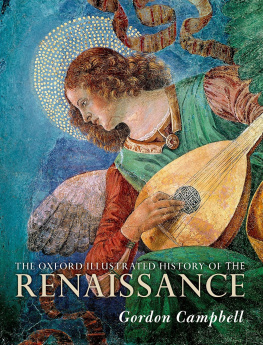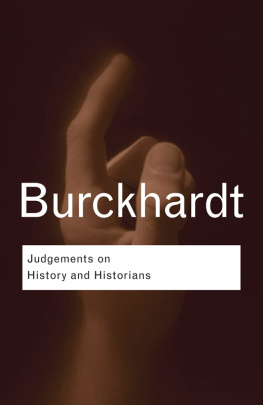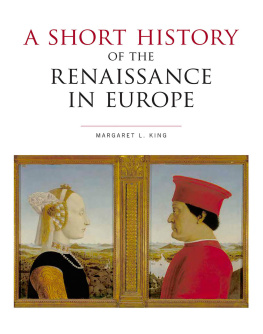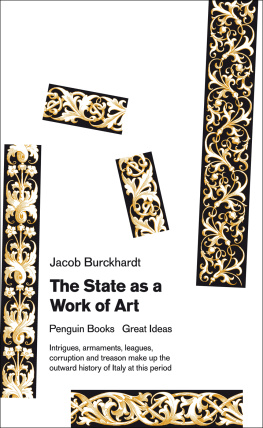PART I.
THE STATE AS A WORK OF ART |
|---|
CHAPTER I.
INTRODUCTION. |
|---|
| PAGE |
| Political condition of Italy in the thirteenth century |
| The Norman State under Frederick II. |
| Ezzelino da Romano |
CHAPTER II.
THE TYRANNY OF THE FOURTEENTH CENTURY. |
|---|
| Finance and its relation to culture |
| The ideal of the absolute ruler |
| Inward and outward dangers |
| Florentine estimate of the tyrants |
| The Visconti |
CHAPTER III.
THE TYRANNY OF THE FIFTEENTH CENTURY. |
|---|
| Intervention and visits of the emperors |
| Want of a fixed law of succession. Illegitimacy |
| Founding of States by Condottieri |
| Relations of Condottieri to their employers |
| The family of Sforza |
| Giacomo Piccinino |
| Later attempts of the Condottieri |
CHAPTER IV.
THE PETTY TYRANNIES. |
|---|
| The Baglioni of Perugia |
| Massacre in the year 1500 |
| Malatesta, Pico, and Petrucci |
CHAPTER V.
THE GREATER DYNASTIES. |
|---|
| The Aragonese at Naples |
| The last Visconti at Milan |
| Francesco Sforza and his luck |
| Galeazzo Maria and Ludovic Moro |
| The Gonzaga at Mantua |
| Federigo da Montefeltro, Duke of Urbino |
| The Este at Ferrara |
CHAPTER VI.
THE OPPONENTS OF TYRANNY. |
|---|
| The later Guelphs and Ghibellines |
| The conspirators |
| Murders in church |
| Influence of ancient tyrannicide |
| Catiline as an ideal |
| Florentine view of tyrannicide |
| The people and tyrannicide |
CHAPTER VII.
THE REPUBLICS: VENICE AND FLORENCE. |
|---|
| Venice in the fifteenth century |
| The inhabitants |
| Dangers from the poor nobility |
| Causes of the stability of Venice |
| The Council of Ten and political trials |
| Relations with the Condottieri |
| Optimism of Venetian foreign policy |
| Venice as the home of statistics |
| Retardation of the Renaissance |
| Medival devotion to reliques |
| Florence from the fourteenth century |
| Objectivity of political intelligence |
| Dante as a politician |
| Florence as the home of statistics: the two Villanis |
| Higher form of statistics |
| Florentine constitutions and the historians |
| Fundamental vice of the State |
| Political theorists |
| Macchiavelli and his views |
| Siena and Genoa |
CHAPTER VIII.
FOREIGN POLICY OF THE ITALIAN STATES. |
|---|
| Envy felt towards Venice |
| Relations to other countries: sympathy with France |
| Plan for a balance of power |
| Foreign intervention and conquests |
| Alliances with the Turks |
| Counter-influence of Spain |
| Objective treatment of politics |
| Art of diplomacy |
CHAPTER IX.
WAR AS A WORK OF ART. |
|---|
| Firearms |
| Professional warriors and dilettanti |
| Horrors of war |
CHAPTER X.
THE PAPACY AND ITS DANGERS. |
|---|
| Relation of the Papacy to Italy and foreign countries |
| Disturbances in Rome from the time of Nicholas V. |
| Sixtus IV. master of Rome |
| States of the Nipoti in Romagna |
| Cardinals belonging to princely houses |
| Innocent VIII. and his son |
| Alexander VI. as a Spaniard |
| Relations with foreign countries |
| Simony |
| Csar Borgia and his relations to his father |
| Csars plans and acts |
| Julius II. as Saviour of the Papacy |
| Leo X. His relations with other States |
| Adrian VI. |
| Clement VII. and the sack of Rome |
| Reaction consequent on the latter |
| The Papacy of the Counter-Reformation |
| Conclusion. The Italian patriots |
PART II.
THE DEVELOPMENT OF THE INDIVIDUAL. |
|---|
CHAPTER I.
THE ITALIAN STATE AND THE INDIVIDUAL. |
|---|
| The medival man |
| The awakening of personality |
| The despot and his subjects |
| Individualism in the Republics |
| Exile and cosmopolitanism |
CHAPTER II.
THE PERFECTING OF THE INDIVIDUAL. |
|---|
| The many-sided men |
| The universal men |
CHAPTER III.
THE MODERN IDEA OF FAME. |
|---|
| Dantes feeling about fame |
| The celebrity of the Humanists: Petrarch |
| Cultus of birthplace and graves |
| Cultus of the famous men of antiquity |
| Literature of local fame: Padua |
| Literature of universal fame |
| Fame given or refused by the writers |
| Morbid passion for fame |
CHAPTER IV.
MODERN WIT AND SATIRE. |
|---|
| Its connection with individualism |
| Florentine wit: the novel |
| Jesters and buffoons |
| Leo X. and his witticisms |
| Poetical parodies |
| Theory of wit |
| Railing and reviling |
| Adrian VI. as scapegoat |
| Pietro Aretino |
PART III.
THE REVIVAL OF ANTIQUITY. |
|---|
CHAPTER I.
INTRODUCTORY REMARKS. |
|---|
| Widened application of the word Renaissance |
| Antiquity in the Middle Ages |


